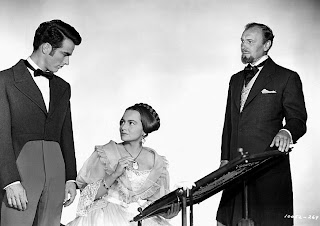One month ago today we lost Celeste Holm (1917-2012), one of the few remaining figures from Hollywood’s Golden Age. Of that august body, the only four survivors that come to mind are Olivia de Havillland (born 1916), Kirk Douglas (born 1916), Mickey Rooney (born 1920), and Shirley Temple (born 1928). I’m sure it’s possible that, some 60 years hence, someone will write an appreciation of Ben Affleck while contemplating with nostalgia the Millennium Era of Hollywood, but I somehow doubt it.
It’s hard for people born into the era of movies like The Avengers, The Dark Knight Rises and yet another version of Spider-Man, to remember (or understand) that films were once made by, and for, adults. (And, seriously, does our culture really need a “realistic” Batman movie? Isn’t the very phrase fairly insulting? Could you imagine anyone with a straight face 40 or 50 years ago suggesting that adult audiences would greet the notion of a “dark” superhero film with anything other than blank incomprehension or withering disdain? And isn’t this stuff supposed to be fun, anyway? Please don’t get me wrong – I enjoy a Batman film as next as the next fellow, and was entertained by both the 1960s comedy series and the Tim Burton films. But … have we degenerated so as a culture that the story of a millionaire dressed like a giant bat so he could punch a homicidal clown is now considered worthy of an “adult” take?) In such an atmosphere, it’s somehow consoling to remember that films were once made by adults and not a culture of arrested adolescents.
Holm was a staple on Broadway and film for decades. She won an Academy Award for her performance in Gentleman’s Agreement (1947), one of the first films to seriously address anti-Semitism, and was nominated for her performances in Come to the Stable (1949) and the classic All About Eve (1950). On Broadway she originated the role of Ado Annie in Oklahoma!, and in 1991 I was lucky enough to see her as an aging actress in Paul Rudnick’s comedy about the ghost of John Barrymore, I Hate Hamlet.
Holm had a very distinct screen persona. Her somewhat plain, non-glamorous beauty hinted at an inner warmth, and her natural reserve suited her for roles as patrician or distant women. Always more convincing as a socialite than a tart, Holm managed to bring an element of Yankee gentility to any endeavor. To see two disparate sides of Holm, watch her nearly incandescent turn as a nun in Come to the Stable and then see her as chanteuse Flame O’Neill in the riotous comedy Champagne for Caesar (1950). For a taste of her range, watch Holm cornered by the duplicitous Anne Baxter in All About Eve here: http://www.youtube.com/watch?v=987UWPKQVQA.
About 15 years ago I had the great pleasure to dine with Holm at the apartment of lyricist Fred Ebb (1928-2004). My friend, film scholar and writer Jim Nemeth, had “won” Holm for dinner at a charitable auction, and she regaled us for over four hours with stories alternately salty and scandalous. For a woman so composed and serene onscreen, she could be quite surprising in the flesh. (There is a reason it’s called “acting.”) She spared nobody.
Asked about her Caesar co-star Vincent Price, Holm asked, “why would you want to know about him? He couldn’t act.” That was a comment not nearly as withering as her take on Stable costar Loretta Young, whom she called “a chocolate-covered black widow spider.”
About her Eve costars, she was equally brutal. Hugh Marlowe was “dull,” and she had no comment on George Sanders, who she claimed only spoke to the director and never to the rest of the cast. She called Baxter “ambitious,” and Bette Davis a word that rather rhymes with “ambitious.”
She had some genuinely nice things to say about her High Society (1956) co-star Frank Sinatra, but added, “you wouldn’t want to cross him.” She dismissed Nicol Williamson (Barrymore in I Hate Hamlet) as a “drunk” and pronounced Julie Andrews (they worked together in television’s Cinderella) “cold.” The biggest mistake of her career was not made by herself, but, rather, the producers of the film version of Oklahoma!, who did not ask her to reprise her stage role as Ado Annie. Perhaps my favorite Holm-ism was her take on her fans: “When someone tells me they like Gentlemen’s Agreement, I know they’re a West Side liberal. When they mention Eve, I know they’re gay.”
It was, in short, an unforgettable evening. Though I found the real Celeste Holm very different from the reel one, she was a woman who will be greatly missed.


